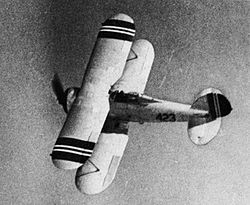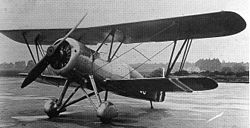| Type | # in use | Period | Notes |
| Royal Norwegian Navy Air Service |
|---|
| Rumpler Taube | 1 | 1912-1922 | Start, with first flights 1 and 7 June 1912, the first aircraft of the Royal Norwegian Navy Air Service that was established in 1916. |
| Maurice Farman S.3 Longhorn | 1 | 1914 | Roald Amundsen was originally a gift from Roald Amundsen to the Norwegian Army Air Service, but was lent to the Royal Norwegian Navy Air Service |
| Marinens Flyvebaatfabrikk MF.1 | 6 | 1915- | |
| Marinens Flyvebaatfabrikk MF.2 | 3 | 1916-1924 | |
| Marinens Flyvebaatfabrikk MF.3 | 4 | 1917-1924 | |
| Sopwith Baby | 18 | 1917-1931 | |
| Marinens Flyvebaatfabrikk MF.4 | 7 | 1918- | Some MF.1s were rebuilt to MF.4 to bring the number to seven |
| Marinens Flyvebaatfabrikk MF.5 | 8 | 1918-1926 | |
| Nielsen & Winther | 1 | 1918 | |
| Supermarine Channel I | 5 | 1920-1923 | |
| Lübeck-Travemünde F.4 | 2 | 1920-1924 | Last flight 1924, scrapped 1927 and 1930 |
| Marinens Flyvebaatfabrikk MF.6 | 2 | 1921-1927 | |
| Savoia S.13 | 1 | 1921-1928 | Gift |
| Hansa Brandenburg W.33 | 30 | 1922-1935 | |
| Marinens Flyvebaatfabrikk MF.7 | 2 | 1923-1931 | |
| Marinens Flyvebaatfabrikk MF.8 | 2
8B: 2 | 1924-1934
1930-1939* | |
| Douglas DT-2B/C | 8 | 1925-1940 | Single example delivered by Douglas, the rest built under licence by Marinens Flyvebaatfabrikk. |
| Marinens Flyvebaatfabrikk MF.9 | 15 | 1926-1932 | |
| Marinens Flyvebaatfabrikk MF.10 | 4 | 1929-1940 | |
| Marinens Flyvebaatfabrikk MF.11 | 29 | 1932-1940 | Three aircraft interned in Finland were used by the Finns until 1944 |
| Breda Ba 28 | 4 | 1936-1940 | Five were ordered to save an Italian-Norwegian cod fish trading deal, one crashed in Italy almost killing Finn Lützow-Holm |
| Marinens Flyvebaatfabrikk MF.12 | 1 | 1939 | |
| Heinkel He 115A-2 | 6+2 | 1939-1943 | Six delivered in 1939, plus two captured from the Luftwaffe after the invasion. An order for a further six were placed, but the aircraft were not delivered by 9 April 1940.
The last of the delivered aircraft were scrapped in Woodhaven in 1943. Four aircraft served with RAF, one served in Finland |
| Junkers Ju 52 | 1 | 1940 | Hauken was rented from DNL from January 1940 until the invasion 9 April |
| Arado Ar 196A | 1 | 1940 | Interned near Kristiansund 8 April 1940, taken into Norwegian service the following day. Destroyed in landing accident in Glasgow later in April 1940 |
| Norwegian Army Air Service |
|---|
| Maurice Farman S.3 Longhorn | 3 | 1912-1925 | Ganger Rolf and Njaal were bought with funds from Norsk Luftseiladsforening. Olav Trygvassøn was a gift with a clause; it was to be stationed in Trøndelag. Specified in 3 rows below. |
| Maurice Farman MF.7 | (1) | 1912-1925 | Ganger Rolf, built at Heradsbygd south of Elverum in 1912 with Norways first military flight 1 September 1912, one of the first two aircraft of the Royal Norwegian Air Force. |
| Maurice Farman MF.7 | (1) | 1912-1925 | Njaal, built at Kjeller airport with first flight at Kjeller 21 September 1912, one of the first two aircraft of the Royal Norwegian Air Force. |
| Maurice Farman MF.7 | (1) | 1914-1925 | S.3, trainer donated by Roald Amundsen in 1914 and transferred to Royal Norwegian Navy Air Service. |
| Bleriot XI | 1 | 1914-1915 | Tryggve Gran's Nordsjøen |
| Hærens Flyvemaskinfabrikk FF.1 | | | Einar Sem-Jacobsen visited Maurice Farman in France, but could not get the drawings for the aircraft he saw there, so he drew FF.1 from memory |
| Hærens Flyvemaskinfabrikk FF.2 | | | Based on FF.1 |
| Hærens Flyvemaskinfabrikk FF.3 Hydro | 4 | 1917- | Based on a Farman Sem-Jacobsen had obtained drawings of. |
| Farman F.40 | XL II: 2
LX: 10 | 1916-1917
1917-1922 | |
| Royal Aircraft Factory BE.2e | 15 | 1917-1925 | |
| Avro 504 | 5 | 1918-1930 | The last, delivered in 1922, was a gift from Roald Amundsen. |
| Hærens Flyvemaskinfabrikk FF.4 | 2 | | Five planned, but prototype was a failure. An improved version did not fare much better, and both were soon withdrawn from service and sold at an auction |
| Hærens Flyvemaskinfabrikk FF.5 (T.1) | T.1: 1
T.1B: 6
T.1C: 11 | 1918
1919-
1921-1924 | T.1, based on BE.2e, was a failure. T.1B, based on Avro 504 got into use, but was no success. |
| Farman F.46 | 2 | 1920-1922 | |
| Hærens Flyvemaskinfabrikk FF.6 (T.2) | 1 | 1921 | Five planned, but the prototype turned out to be a failure; the test pilot refused to go up again after the first test flight. Scrapped 1922 |
| Bristol F.2 Fighter | 5 | 1921-1930 | |
| Hærens Flyvemaskinfabrikk FF.7 Hauk | 14 | 1923-1929 | Hannoversche Waggonfabrik's CL.V built under licence |
| Hærens Flyvemaskinfabrikk FF.8 Måke | Måke I: 2
Måke II: 7
Måke III: 4 | -1928
1921-
1928- | Hansa Brandenburg W.29 built under licence, Måke I and II by Norsk Aerofabrik, Måke III by HF |
| Hærens Flyvemaskinfabrikk FF.9 Kaje | | | |
| Fokker C.V.D | 27 | 1931-1940 | All built under licence by Hærens Flyvemaskinfabrikk |
| Fokker C.V.E | 20 | 1930-1940 | Five delivered by Fokker, the rest built under licence by HF |
| de Havilland DH.60 Moth | 13 | 1930-1940 | Three second-hand aircraft bought from de Havilland, 10 built under licence by HF |
| de Havilland DH.82 Tiger Moth | 38 | 1933-1940 | All built under licence by HF |
| Cierva C.30A | 1 | 1935-1936 | Gift, sold after a year, hardly used |
| Svenska Aero J6B Jaktfalk | 1 | 1932-1936 | One Jaktfalk and One Fury bought for a fly-off for the next Norw. fighter |
| Hawker Fury I | 1 | 1933-1936 | |
| Armstrong Whitworth AW35 Scimitar | 4 | 1936-1940 | 40 projected built under licence by HFF, project abandoned when Scimitar was not selected by RAF |
| Gloster Gladiator | Mk.I: 6
Mk.II: 6 | 1937-1940
1940 | |
| Caproni Ca.310 | 4 | 1938-1940 | Bought in a dried and salted cod deal. In addition, two Ca.312 were ordered in the spring of 1940. |
| Curtiss 75A-6 | 19 | 1940 | 19 from an order of 24 delivered prior to the German invasion, most still in crates. Shipment with last five diverted to UK |
| War years: Little Norway, squadrons in RAF and the Stockholm Element |
|---|
| Hawker Hurricane | | | 331 Sqdn |
| Supermarine Spitfire | | | 331 & 332 Sqdn |
| Auster AOP.1 | 9 | 1944-1945 | 132 (N.) Wing (331 & 332 Sqdn.) hack |
| Bristol Beaufighter I | 3 | 1943 | On loan to 333 Sqdn from 235 Sqdn |
| Airspeed Oxford I | 2 | | |
| Northrop N-3PB | 24 | | 330 Sqdn |
| Fairchild M-62 | | | Little Norway |
| Curtiss 75A-8 | 36 | | Little Norway |
| Douglas 8A-5 | 36 | | Little Norway |
| Interstate Cadet | 2 | | Little Norway |
| Waco SRE | | | Little Norway |
| Stinson Reliant | 7 | | Little Norway |
| Noorduyn Norseman IV | 1 | | Little Norway, rented a short period |
| Consolidated Catalina IIIA | | | |
| Short Sunderland | Mk. III:
Mk.V: |
| |
| de Havilland Mosquito | | | |
| Lockheed Lodestar | | | Stockholm Element |
| Royal Norwegian Air Force 1945- |
|---|
Agusta-Bell 47J/J-2
Bell 47D-1
G-3 | 5
6
3 | 1958-1967
1953-1971
1954-1970 | |
| Airspeed Oxford I/II | 22 | 1947-1953 | |
| Avro Anson I | 10 | 1947-1951 | |
| Bell UH-1B | 37 | 1963-1990 | |
| Bell 412SP | 18 | 1987- | |
| Cessna L-19A (O-1A) | 27 | 1960-1992 | |
| Consolidated Catalina | IV A: (3)
IV B: 12
PBY-5A: 6 | 1945-1946
1945-1954
1954-1961 | |
| Dassault Falcon 20 | 3 | 1972- | |
| de Havilland Canada DHC-3 Otter | 10 | 1953-1968 | |
| de Havilland Canada DHC-6 Twin Otter | 5 | 1967-2001 | |
| de Havilland Mosquito | T.III: 3
FB VI: 19 | 1947-1952
1945-1952 | |
| de Havilland Vampire | T.55: 6
F.III: 20
FB 52: 36 | 1952-1955
1948-1957
1949-1957 | |
| Douglas C-47A | 7
10 | 1945-1946
1950-1974 | |
| Douglas C-53D | 3 | 1945-1946 | |
| Fairchild M-62 | 74 | 1945-1957 | |
| Fairchild C-119G Flying Boxcar | 8 | 1956-1969 | |
| Fiesler Fi 156 Storch | 30 | 1945-1954 | |
| General Dynamics F-16 Fighting Falcon | A: 60
B: 14 | 1980-2022
1980-2022 | Original order of 74 aircraft built under licence by Fokker mainly being (block 15 and 20 but, earlier on block 1, 5 and 10), two attrition aircraft from GD. most jets were upgraded to the OCU and later on MLU upgrades. On 6 January 2022, Norway announced that all F-16s had been retired. [1] |
| Grumman HU-16B (ASW) Albatross | 18 | 1961-1969 | |
| Junkers Ju 52/3m | 18 | 1945-1951 | |
| Lockheed C-56B/C-60A Lodestar | 7 | 1945-1950 | |
| Lockheed C-130E/H Hercules | 6 | 1969-2008 | |
| Lockheed C-130J Super Hercules | 5 | 2008- | |
Lockheed F-104 Starfighter
(Canadair CF-104) | F-104G: 24
TF-104G: 4
CF-104: 21
CF-104D: 3 | 1963-1981
1963-1983
1973-1983
1973-1983 | |
| Lockheed Martin F-35 Lightning IIA | 49 | 2016- | 52 F-35As planned in total. |
| Lockheed P-3 Orion | B: 5
C: 4
N: 2 | 1969-1989
1989-
1980- | |
| Lockheed T-33A | 22 | 1953-1968 | |
| MFI 15 Safari | 18 | 1981- | |
| Noorduyn Norseman IV/VI | 24 | 1945-1959 | |
| North American Harvard II/IIB/SNJ3/4 | 39 | 1945-1956 | |
| North American F-86 Sabre | F-86F: 115
F-86K: 64 | 1957-1967
1955-1967 | |
| Northrop N-3PB | 2 | 1945-1956 | |
| Northrop F-5 Freedom Fighter | A: 98
B: 14
RF-5A: 16 | 1966-2000
1966-2000
1969-2000 | |
| Piper L-18C | 16 | 1955-1992 | |
| Republic F-84 Thunderjet | F-84E: 6
F:84G: 200
RF-84F: 35 | 1951-1956
1952-1960
1956-1970 | |
| SAAB 91B/B-2 Safir | 30 | 1956-1988 | |
| Short Sunderland Mk V | (11) | 1945 | |
| Sikorsky H-19D-4 | 4 | 1958-1967 | |
| Supermarine Spitfire | LF.IXe: 73
PR XI: 3 | 1945-1952
1946-1954 | |
| Westland Lynx Mk.86 | 6 | 1981-2014 | |
| Westland Sea King Mk.43/43B | 12 | 1971- | To be replaced by AW101 |
| Focke-Wulf Fw 189A-2 | 1 | 1945-1946 | |
| Messerschmitt Bf 108 Taifun | 2 | 1945 | |
| Junkers W 34 | 1 | 1945-1946 | |
| AW101 SAR Queen | 16 | 2020- | [2] All 16 delivered to Norway by June 2025 [3] |






